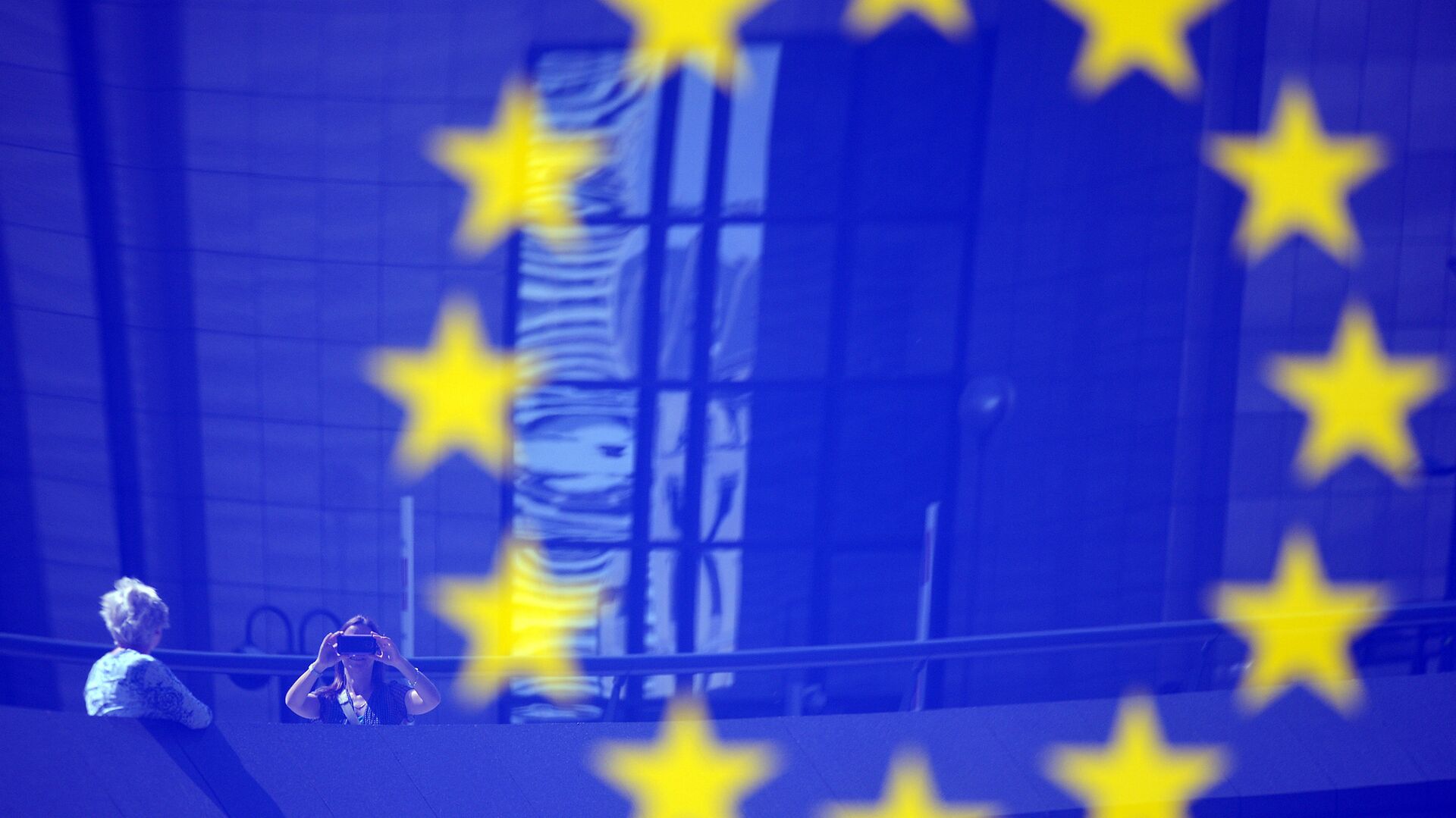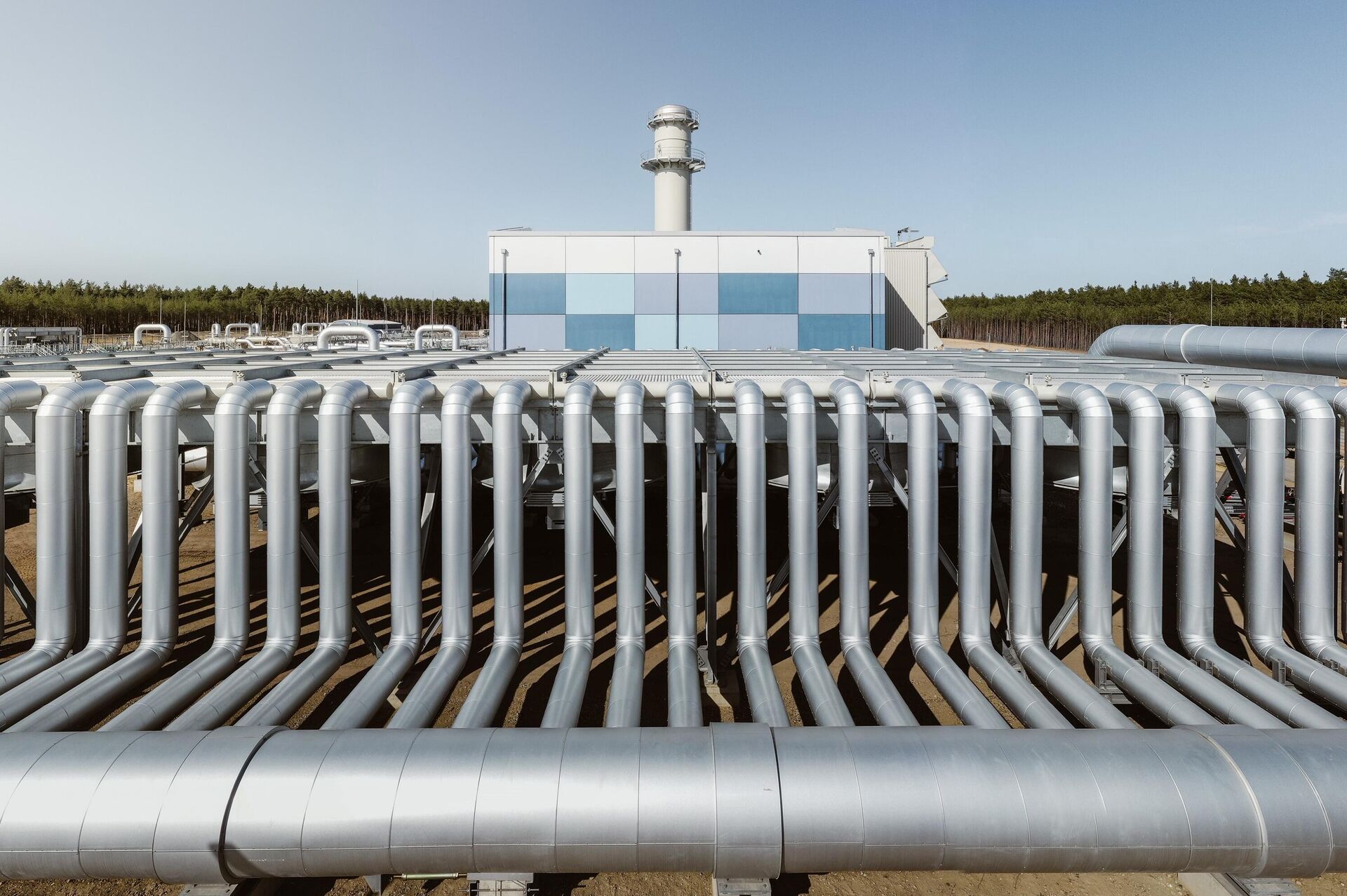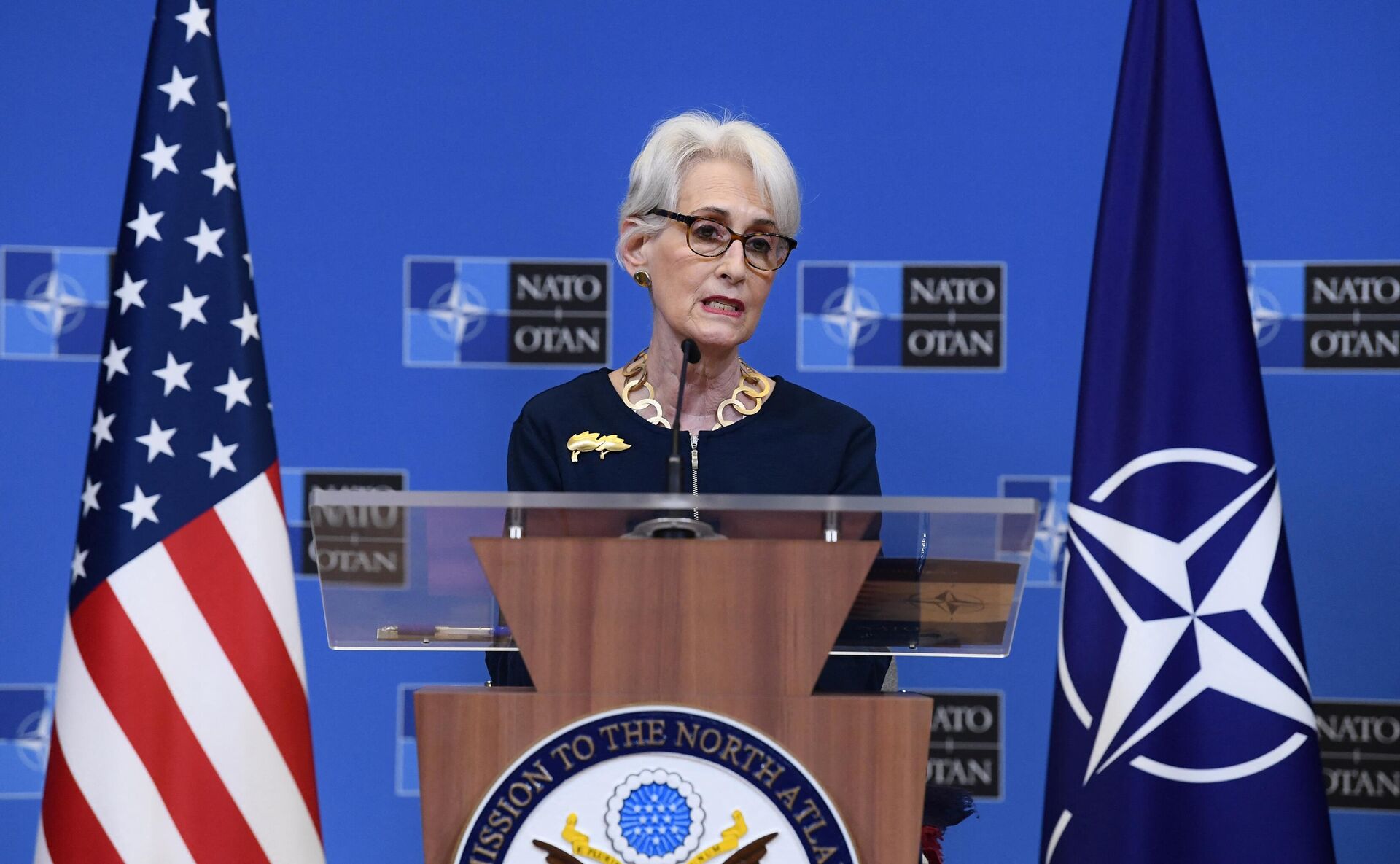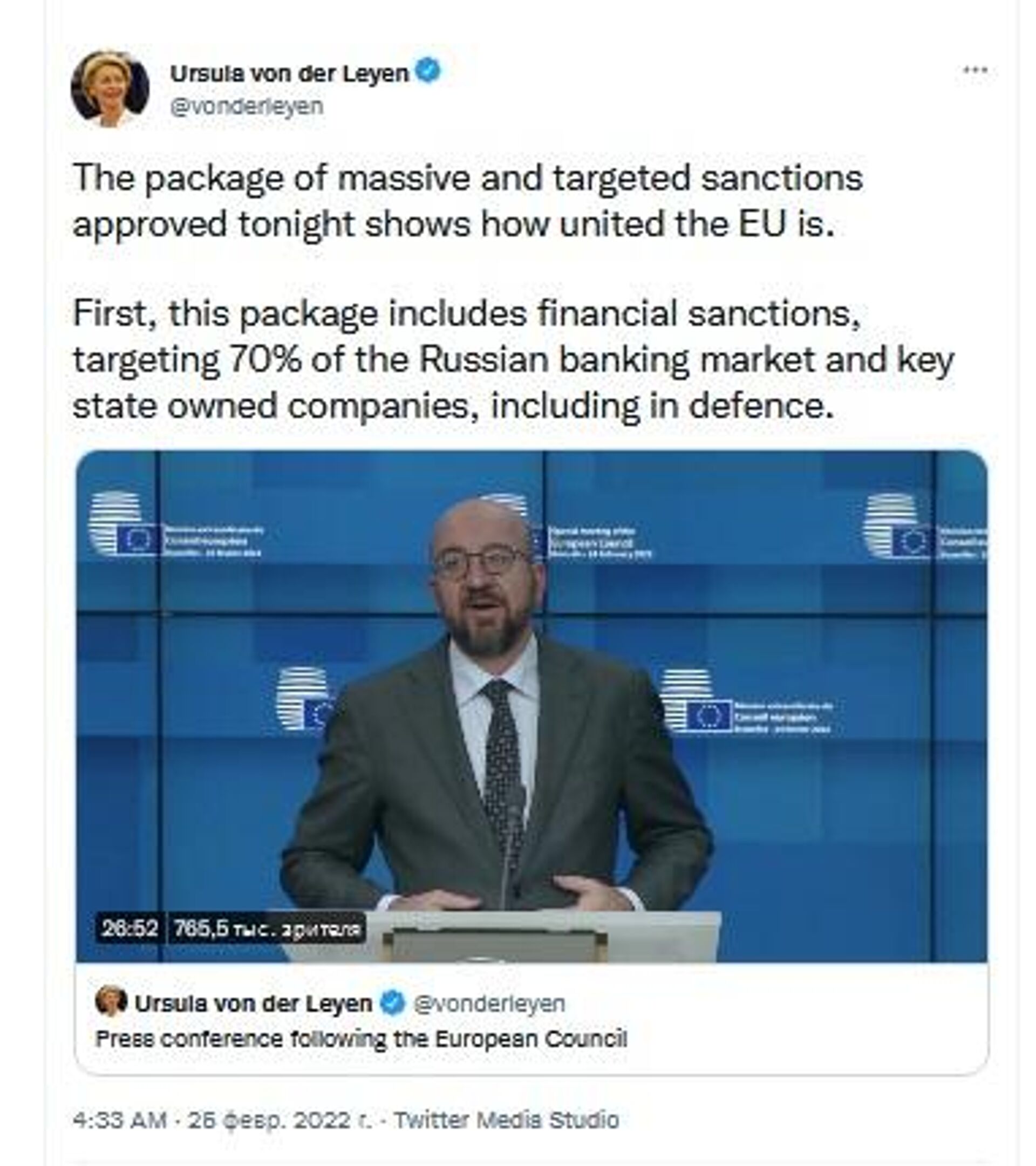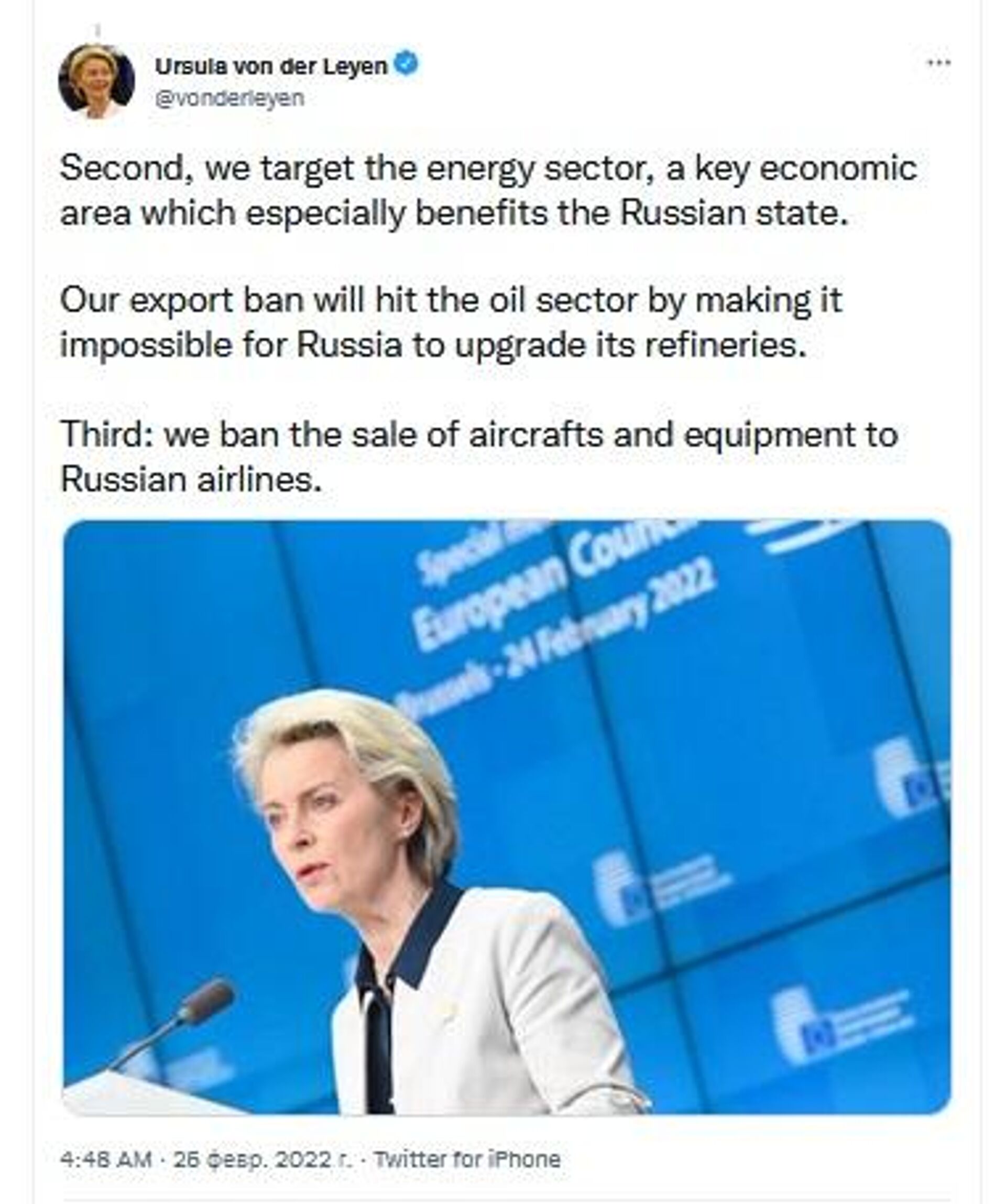https://sputnikglobe.com/20220225/eu-sanctions-on-russia-will-amplify-gas-price-rally-making-energy-crisis-far-worse-analysts-say-1093366535.html
EU Sanctions on Russia Will Amplify Gas Price Rally Making Energy Crisis Far Worse, Analysts Say
EU Sanctions on Russia Will Amplify Gas Price Rally Making Energy Crisis Far Worse, Analysts Say
Sputnik International
European energy prices have jumped nearly 70% and oil exceeded $105 per barrel in the wake of the announcement of new tough anti-Russian sanctions over... 25.02.2022, Sputnik International
2022-02-25T12:22+0000
2022-02-25T12:22+0000
2022-02-25T12:22+0000
us
europe
russia
ukraine
natural gas
gas prices
opinion
world
sanctions
nord stream 2
https://cdn1.img.sputnikglobe.com/img/106128/54/1061285449_0:160:3077:1890_1920x0_80_0_0_64bd6ccecbcad575933e68dc80c2465f.jpg
"The escalation of the Ukraine crisis into an armed conflict has created an upheaval in crude oil and gas prices", says Dr Mamdouh G. Salameh, an international oil economist and visiting professor of energy economics at the ESCP Europe Business School in London. "However, if US and EU sanctions include sanctioning Russian gas and oil exports, this could cause gas and crude oil prices to rise much further".The European Council on 24 February stated it had agreed on a new batch of sanctions targeting key Russian economic sectors in response to Moscow's special military operation in Ukraine. According to the EU body, "these sanctions cover the financial sector, the energy and transport sectors, dual-use goods, as well as export control and export financing, visa policy, additional listings of Russian individuals, and new listing criteria".In particular, the export ban imposed on Moscow by the EU will hamper Russia's oil refining and sales, according to European Commission President Ursula von der Leyen. They will "hit the oil sector by making it impossible for Russia to upgrade its refineries", von der Leyen announced on Thursday.On 24 February, the price of March futures for gas in Europe skyrocketed to over $1,636 per 1,000 cubic metres, up 60% from Wednesday's indices. Brent crude spiked to over $100 a barrel for the first time since 2014.Earlier this week, Berlin froze the certification of Nord Stream 2, a gas pipeline running under the Baltic Sea from Russia to Germany, over recognition of the Donetsk and Lugansk People's Republics by Moscow on 21 February. According to Salameh, it was nothing but a cosmetic move "since the Russian pipeline has been sitting idle waiting for certification since its completion in September 2021". Moreover, Scholz's decision doesn't mean stopping Nord Stream 2 altogether, the energy expert stresses. On the one hand, by killing the pipe Scholz would sink European energy giants who invested a lot in the project, on the other hand, Germany is dependent on Russian oil and gas for 65% of its needs, according to Salameh.Nord Stream 2 is designed to deliver 55 billion cubic metres (bcm) of natural gas per year to Europe, thus doubling the original Nord Stream capacity to a total of 110 bcm. The pipeline cost €9.5 billion ($10.6 billion) to build, with roughly half of this sum being financed by a European consortium of companies, including OMV (Austria), Wintershall Dea (Germany), Engie (France), Uniper (Germany), and Shell (UK).For its part, Washington on 23 February introduced sanctions against Nord Stream AG, the company in charge of building the pipeline. Starting with Barack Obama, successive US administrations have sought to axe the project and expel Russia from the European energy market. The US urged the EU to switch to American liquefied natural gas (LNG).Yet, the combined LNG exports of the United States, Qatar, and Australia cannot replace Russian piped gas supplies (200 billion cubic metres [bcm] and 15-16 million tonnes [mt]) stresses Salameh, adding that the EU doesn't have enough LNG import capacity infrastructure to replace Russia's gas market share - which makes up more than 40 percent of the European gas market.'Suicide by Cop'If Europe moves to abandon Russia's energy imports it would be nothing short of what Americans call "suicide by cop", notes Tom Luongo, a geopolitical analyst and publisher of the Gold Goats 'n Guns Newsletter: "That's where someone wants to die and picks a fight with a policeman in order to get the cop to shoot him".In mid-December, Russia handed over its draft security proposals to the US and NATO to ensure European security and stability. On 26 January 2022, Russia received written responses to its proposals from Washington and the alliance. Both the US and NATO disregarded Moscow's core demands about the alliance's non-expansion, Ukraine's non admission to the bloc, non-deployment of offensive weapons systems near Russia's borders, and the return of the bloc's European capabilities and infrastructure to 1997 levels.In addition, Moscow asked individual European nations for views on the continent's security. The EU foreign security chief, Josep Borrell, responded on behalf of the 27 EU member states. According to Bloomberg, Borrell's response was coordinated with NATO and repeated major points outlined by the North Atlantic Alliance's letter to Moscow.Russia's repeated pleas to the EU to persuade the Ukrainian leadership to adhere to the Minsk Protocol approved by the UN Security Council in 2015 had also borne no fruit, as Kiev refused to hold direct talks with the DPR and LPR, which was a crucial provision of the Minsk deal. Instead, NATO, the US, the UK, and some EU members provided considerable amounts of weapons and sent military advisers to Kiev amid the Ukrainian government's military buildup along the contact line with Donbass and intensification of shelling against the Donetsk and Lugansk People's Republics in further defiance of the Minsk agreements.
ukraine
Sputnik International
feedback@sputniknews.com
+74956456601
MIA „Rossiya Segodnya“
2022
News
en_EN
Sputnik International
feedback@sputniknews.com
+74956456601
MIA „Rossiya Segodnya“
Sputnik International
feedback@sputniknews.com
+74956456601
MIA „Rossiya Segodnya“
us, europe, ukraine, natural gas, gas prices, opinion, sanctions, nord stream 2, nord stream ag, nato, nato expansion
us, europe, ukraine, natural gas, gas prices, opinion, sanctions, nord stream 2, nord stream ag, nato, nato expansion
EU Sanctions on Russia Will Amplify Gas Price Rally Making Energy Crisis Far Worse, Analysts Say
European energy prices have jumped nearly 70% and oil exceeded $105 per barrel in the wake of the announcement of new tough anti-Russian sanctions over Moscow's special military operation to protect the Donetsk and Lugansk People's Republics.
"The escalation of the Ukraine crisis into an armed conflict has created an upheaval in crude oil and gas prices", says Dr Mamdouh G. Salameh, an international oil economist and visiting professor of energy economics at the ESCP Europe Business School in London. "However, if US and EU sanctions include sanctioning Russian gas and oil exports, this could cause gas and crude oil prices to rise much further".
The European Council on 24 February stated it had agreed on a new batch of sanctions targeting key Russian economic sectors in response to
Moscow's special military operation in Ukraine.
According to the EU body, "these sanctions cover the financial sector, the energy and transport sectors, dual-use goods, as well as export control and export financing, visa policy, additional listings of Russian individuals, and new listing criteria".
In particular, the export ban imposed on Moscow by the EU will hamper Russia's oil refining and sales, according to European Commission President Ursula von der Leyen. They will "hit the oil sector by making it impossible for Russia to upgrade its refineries", von der Leyen announced on Thursday.
On 24 February, the price of
March futures for gas in Europe skyrocketed to over $1,636 per 1,000 cubic metres, up 60% from Wednesday's indices. Brent crude spiked to over $100 a barrel for the first time since 2014.
"Russia is the biggest supplier of both natural gas and crude oil to the European Union (EU) accounting for more than 40 percent of the EU's gas needs and 27 percent of crude oil", says Salameh. "Therefore, it would be illogical for the EU to sanction Russian oil and gas exports. If it does or willingly refuses to buy Russian gas, prices will skyrocket further thus inflicting an extremely heavy blow on the EU economies and prolonging and worsening Europe's ongoing energy crisis".
Earlier this week, Berlin froze the certification of Nord Stream 2, a gas pipeline running under the Baltic Sea from Russia to Germany, over recognition of the Donetsk and Lugansk People's Republics by Moscow on 21 February. According to Salameh, it was nothing but a cosmetic move "since the Russian pipeline has been sitting idle waiting for certification since its completion in September 2021". Moreover, Scholz's decision doesn't mean stopping Nord Stream 2 altogether, the energy expert stresses. On the one hand, by killing the pipe Scholz would sink European energy giants who invested a lot in the project, on the other hand, Germany is dependent on Russian oil and gas for 65% of its needs, according to Salameh.
Nord Stream 2 is designed to deliver 55 billion cubic metres (bcm) of natural gas per year to Europe, thus doubling the original Nord Stream capacity to a total of 110 bcm. The pipeline cost €9.5 billion ($10.6 billion) to build, with roughly half of this sum being financed by a European consortium of companies, including OMV (Austria), Wintershall Dea (Germany), Engie (France), Uniper (Germany), and Shell (UK).
For its part, Washington on 23 February introduced sanctions against Nord Stream AG, the company in charge of building the pipeline. Starting with Barack Obama, successive US administrations have
sought to axe the project and expel Russia from the European energy market. The US urged the EU to switch to American liquefied natural gas (LNG).
Yet, the combined LNG exports of the United States, Qatar, and Australia cannot replace Russian piped gas supplies (200 billion cubic metres [bcm] and 15-16 million tonnes [mt]) stresses Salameh, adding that the EU doesn't have enough LNG import capacity infrastructure to replace Russia's gas market share - which makes up more than 40 percent of the European gas market.
If Europe moves to abandon Russia's energy imports it would be nothing short of what Americans call "suicide by cop", notes Tom Luongo, a geopolitical analyst and publisher of the Gold Goats 'n Guns Newsletter: "That's where someone wants to die and picks a fight with a policeman in order to get the cop to shoot him".
"Europe is staring at a complete collapse of its economy if they sanction Russia's energy sector and shut down its ability to do business with their banks", Luongo says. "The question no one is asking is, 'Did they provoke this fight on purpose to do exactly this?' From where I'm sitting, it looks to me like their insistence on zero diplomatic concessions to Russia led directly to this outcome. So, the answer to my question is 'Yes, it was deliberate'".
In mid-December, Russia handed over its draft security proposals to the US and NATO to ensure European security and stability. On 26 January 2022, Russia received written responses to its proposals from Washington and the alliance. Both the US and NATO disregarded Moscow's core demands about the alliance's non-expansion, Ukraine's non admission to the bloc, non-deployment of offensive weapons systems near Russia's borders, and the return of the bloc's European capabilities and infrastructure to 1997 levels.
In addition, Moscow asked individual European nations for views on the continent's security. The EU foreign security chief,
Josep Borrell, responded on behalf of the 27 EU member states.
According to
Bloomberg, Borrell's response was coordinated with NATO and repeated major points outlined by the North Atlantic Alliance's letter to Moscow.
Russia's repeated pleas to the EU to persuade the Ukrainian leadership to adhere to the Minsk Protocol approved by the UN Security Council in 2015 had also borne no fruit, as Kiev refused to hold direct talks with the DPR and LPR, which was a crucial provision of the Minsk deal. Instead, NATO, the US, the UK, and some EU members provided considerable amounts of weapons and sent military advisers to Kiev amid the Ukrainian government's military buildup along the contact line with Donbass and
intensification of shelling against the Donetsk and Lugansk People's Republics in further defiance of the Minsk agreements.
"The fallout from this will be far higher energy prices than the weak [European] coalition governments will be able to sustain, I expect the map of Europe will look very different by the end of 2024 than it does today, reaching far beyond Ukraine", Luongo concludes.
